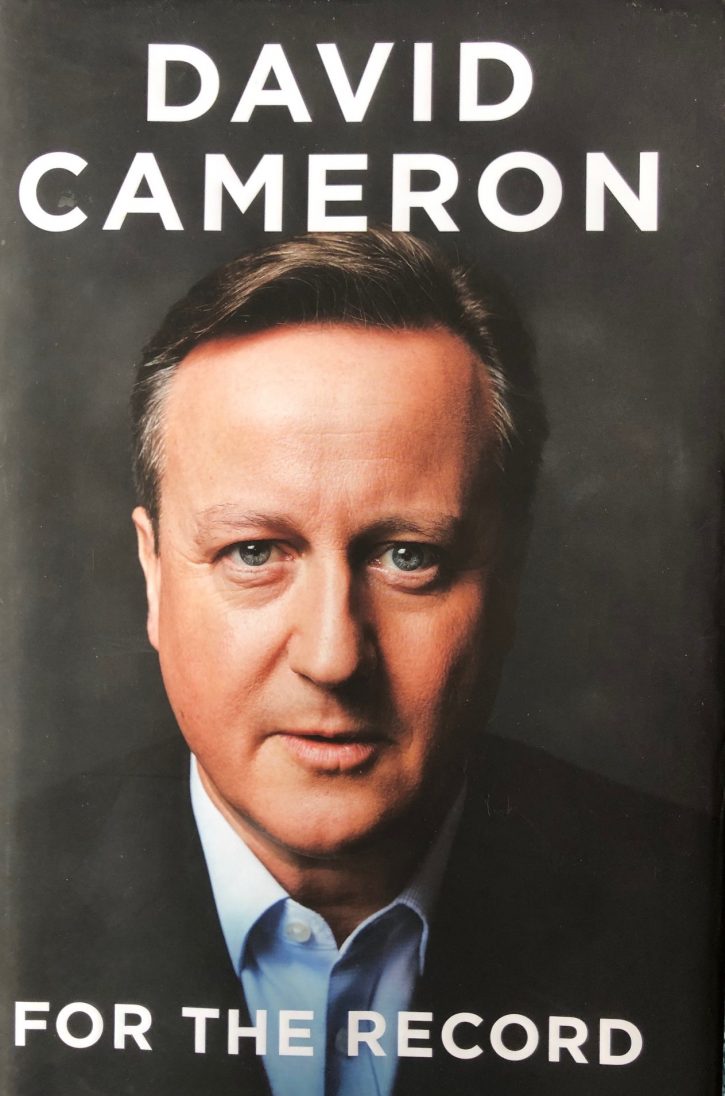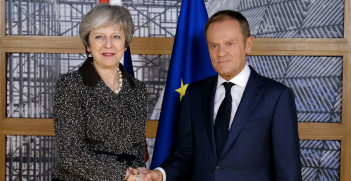Reading Room: David Cameron’s "For the Record"

David Cameron’s memoir appropriately highlights the successes of his Conservative government but is marred by his twisted justifications of the Brexit referendum.
This article was originally published on Australian Outlook on 10 November 2019.
History will remember David Cameron as the man who triggered the referendum that seems set to take Britain out of more than four decades as members of the European Union. His memoir reveals a man who modernised the Conservative Party only to see it divide. When the 732-page For the Record finally went on sale – after three years of toil by Britain’s former prime minister writing in a wooden shepherd’s hut in his Oxfordshire garden – its modest price of £20 was immediately heavily discounted. As Christmas approaches, the book is not on prominent display in most bookshops; nor is it considered an ideal present for family or friends.
There is a reason. Fairly or not, Britain’s youngest prime minister in two centuries, has been widely blamed for the Brexit mess Britain is in today, a direct result of his decision in the summer of 2016 to ask the British people if they wanted their country to leave or remain in the 28-nation European Union. After a foggy referendum campaign, mired by lies, extravagant promises, and evidence of Russian interference, Cameron failed to get the answer he expected or hoped for. Britons voted by 52 to 48 per cent to abandon the institution that had provided them with security and relative prosperity for four decades.
Further, it was widely anticipated in the media, political circles, and the limited serialisation in the Murdoch press of what were deemed the “best bits” of the book, it was an elaborate defence of what many saw as indefensible.
That is a shame, because Cameron’s memoir provides many fascinating insights into his 11-year leadership of the Conservative Party. It provides an insight into his early years and the influences that led him into politics and contributed to his unique brand of forward looking, compassionate conservatism.
Cameron transformed the Conservative Party from what Theresa May once billed as the “nasty party” into a progressive and reforming one. Alas, since Cameron’s departure from politics the Tories have reverted to narrow right-wing factionalism while simultaneously reviving their reputation for fiscal prudence.
In his book, Cameron has eschewed the narrow parochialism of Donald Trump and Scott Morrison who, respectively, put America and Australia first. During his term of office, Cameron energetically led Britain into many global and regional conflicts and problems, not always successfully, but with genuine sincerity. Cameron’s arrival in 10 Downing Street coincided with the Global Financial Crisis, which required tough austerity measures to repair a broken budget. Despite this, he managed to introduce ground-breaking reforms.
As he says, his challenge to modernise the Conservative party was not just “a paint job.” It was about “reforming public services, how to make our environment greener, how to make the most of the opportunities offered by technology, how to empower people increasingly disillusioned by centralised politics and the establishment.”
As an Australian arriving in Britain in late 2018, trying to make sense of the Brexit fiasco, I was surprised to discover positive results from Cameron’s initiatives. Notably, in the public service, call centres were significantly better than many of those in the private sector. I was also surprised by the excellent quality of government web sites, particularly the health, taxation, and planning sites. Cameron introduced incentives for small business which, together with job seekers’ allowances and making unemployment pay conditional on actively seeking work, saw the unemployment rate tumble and 2.5 million new jobs created in his term of office.
Cameron also kept his promise that his would be the “greenest government ever.” He faced considerable opposition from Tory “backwoodsman” in his decision to subsidise renewable energy technologies, in contrast to his Australian contemporaries, Abbott and Turnbull, who both derided alternatives to coal and natural gas. He launched the world’s first Green Investment Bank, encouraging investors to put their money into renewables, particularly onshore and offshore wind power, biomass, and carbon capture.
As Australia reduced its aid budget, Cameron controversially increased Britain’s, particularly supporting green funds in developing countries. By the time he left office more than a million households were generating electricity from solar power. But he notes the most remarkable transformation came from wind turbines off Britain’s coasts. “People said this would be ruinously expensive,” he wrote, “but the cost of electricity generated by wind turbines at sea fell from about £150 a kilowatt hour to £120, and is now roughly the same as gas, and cheaper than nuclear.” He claims Britain now has the world’s largest wind power production capacity, generating a quarter of its electricity.
It was Cameron’s centrist policies – and a first-rate campaign run by Australian Lynton Crosby – that won him a solid majority in the 2016 election (it was one subsequently squandered by his successors, Theresa May and Boris Johnson). Johnson is now fighting to win back that majority in the election on 12 December.
Cameron was also active on the international scene, building relationships and often intervening in situations which colleagues and friends found perplexing. Advised by friend and foreign secretary, William Hague, he embraced foreign policy with gusto, flying further and more frequently than any previous Conservative prime minister. No less than a third of his time was spent on trips overseas, foreign policy meetings, hosting foreign leaders, and National Security Council meetings. He says he approached foreign policy challenges as a “liberal Conservative, not a neo-Conservative,” refusing to accept Britain’s decline as a global power, but rather reasserting the country’s global status as “one of our biggest missions in government.”
Cameron devotes much of For the Record to developing his foreign policy record in fascinating detail, with detailed accounts of his personal involvement in the war in Afghanistan, upheavals in the Arab world, relations with Xi Jinping’s China, meetings of G7 and G20, much-publicised terrorist attacks around the world, and, of course, Europe. For a while in his premiership, the eurozone crisis threatened the continent’s currency (but not the Pound), and there were endless moves towards political integration, which Cameron vigorously opposed.
One message that comes from all this is Cameron’s friendship with US president Barack Obama. From his first visit to the White House, they found common ground. Cameron recalls, “Yes, he was a Democrat and I was a Conservative, but when it came to the issues before us, we did not need time to find agreement; he was a likeable, decent man, with a great sense of humour and, as a former law professor, a brilliant ability to analyse the most complex situations.”
Cameron had no time for Obama’s successor. He recalls Donald Trump’s winning of the Republican nomination as “despite (or even perhaps depressingly, thanks to) his protectionist, xenophobic, misogynistic interventions.” Had Cameron remained in office after the referendum, it’s unlikely he would have welcomed Trump on a state visit, as Theresa May did. Like the former House of Commons Speaker John Bercow, he refused to allow the US president to address both houses of Parliament.
Cameron did, however, come up against Obama’s stubborn streak when he embarked on what history may well judge as a failure. He was outraged when Syria’s president, Bashar al-Assad brutally put down the Arab spring revolution. Cameron wanted an international coalition to use force to remove the Syrian dictator. Mindful of the outcome of the Iraq invasion led by president George W Bush, Obama demurred, and the UK Parliament initially rejected military intervention.
I vividly recall a most unusual op-ed in the New York Times, headed “A plea for caution from Russia.” Its author was President Vladimir Putin, who pointed out that, scattered among the opposition, were “more than enough Al-Qaeda fighters and extremists of all stripes battling the government” and seizing foreign weapons provided to al-Assad’s opponents “in one of the bloodiest conflicts in the world.” Unhappily, Putin’s prediction turned out to be true and, ultimately, US, Australian and British forces had to be deployed to destroy the Islamic State caliphate that emerged, with devastating consequences and an immense global refugee problem that has not begun to be solved.
It was that refugee problem that bedevilled Cameron in what was his final failure – the 2016 referendum that did not go the way he wanted. As then Speaker John Bercow noted, Cameron did not need to call a plebiscite. And yet Cameron fills several chapters of his memoir with all manner of justifications, majoring on his fear that the EU was inexorably moving closer to a federation, a kind of United States of Europe.
But, like much that passes for debate in Brussels, Strasbourg and the chancelleries of the 28 EU states, this was more talk than action. The greatest and most successful integration in the EU has been the Single Market, created largely at the behest of Britain’s Margaret Thatcher. It provides the world’s largest free trade area for goods and services serving 500 million people. At its heart are its four coveted freedoms – the free movement of goods, services, and money, and the right to live and work in any of its countries. But no one in Brussels is proposing the French should cease being French, or abandon their generous health service, or the habit of provincial shopkeepers to close for a two hour lunch, or, in the case of Britain and Ireland, drive on the “wrong” side of the road. Taxation and social services, education, customs and religion, public transport, eating and drinking, remain implacably different across the EU 28, and will remain so. It is a much more diversified continent than North America, Australia or even Africa.
The truth of Johnson’s failure in Europe was twofold. First, he became increasingly a prisoner of the Tory right wing who became increasingly concerned about what he called “progressive Conservatism,” recognising policies that seemed more akin to those that had been offered by Tony Blair’s New Labour (before the Opposition lurched to the left under Jeremy Corbyn). They also became unnerved by the growing threat posed by the UK Independence Party (UKIP), whose xenophobic leader Nigel Farage railed against all things EU and was gaining support in the Tory shires and dispossessed former industrial heartlands.
The referendum campaign in June 2016 was a disaster for Cameron. It was led by Boris Johnson, who had previously told Cameron he supported Britain remaining in the EU. It was masterminded by Dominic Cummings, now in Downing Street as Johnson’s chief of staff. To say both men were economical with the truth was an understatement.
Johnson preyed on people’s concerns about rising immigration, and promised to cut numbers (which rose). The Boris red bus, which traversed the country, was emblazoned with slogans – mostly lies. The most notorious was a claim that if Britain remained in the EU, two million Turks would be free to enter the UK when Turkey joined the EU – but such an expansion had already been ruled out by member countries. Another lie asserted that the £350 million-a-week UK contribution to the EU budget would be spent on the National Health Service; not only was the figure grossly exaggerated, but it failed to account for the substantial EU funds flowing into Britain’s education, farm subsidies, infrastructure and assistance to depressed areas.
Cameron details all this in his memoir but reserves his anger for former colleagues who he says betrayed him. Johnson, of course, was one of these, but Cameron’s greatest ire is directed against his former close friend and Cabinet minister, Michael Gove. Gove, he wrote, betrayed him and was “mendacious” and had behaved “appallingly.”
As a result of the referendum, Britain’s future relationship with the EU, its biggest trading partner, will – regardless of the outcome of the present election – remain in doubt for years to come. It will take years for the UK to regain international status, and it may never do so. That said, this is a book to take seriously. It chronicles the efforts of a committed and well-intentioned man who did much to reform his party, only to see it dismembered by his final action.
Colin Chapman is a writer, broadcaster and public speaker, who specialises in geopolitics, international economics, and global media issues. He is a former president of AIIA NSW and was appointed a fellow of the AIIA in 2017.
This article is published under a Creative Commons Licence and may be republished with attribution.





